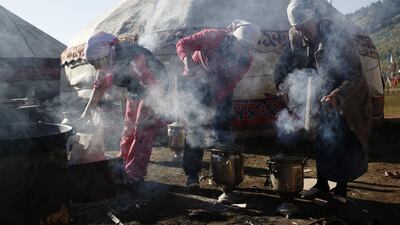Kyrgyzstan is a wild country – 90 per cent lies above 3,300 feet (1,005 metres) and a 41,000-square-kilometre province – half the size of the UAE – has been turned into a biosphere reserve. It is fast becoming a prime destination for those in search of new outdoor pursuits.
On the shore of Song Kol lake at an altitude of 10,000ft (3,048 metres) there’s no phone service, electricity or running water. Here a community of more than 70 yurts offer food and shelter to trekkers passing through Kyrgyzstan’s mountainous heartland for a small fee, just as their ancestors have done for hundreds of years. Each family owns five yurts, while all around, hundreds of cattle, sheep and horses roam an open range that stretches off into the distance.
To the north of the campsite, the interior Tian Shan mountain range towers into the sky. In the south, afternoon thunderstorms wash across the lake. For those accustomed to the modern-world version of life, there is absolutely nothing to do here. At this altitude any sudden movement – a couple of swift steps – and one’s lungs gasp for air.
But the initial boredom forces you out of your comfort zone and to engage with the local tribes who are busy tending to cattle, breaking horses or preparing dinner. The family I stay with has a six-month-old boy. I wonder how long it took him to acclimatise to the lack of oxygen that produces these painful headaches.
“How is life here? How long do you spend living in the yurts? Why do you do this?” I ask the family matriarch over dinner in what surely must rank as an obtuse question. “We spend four months here on the jailoo [summer pasture land] every year. I like it because it’s peaceful,” she says. “When it gets too cold, we’ll go back to the town.”
Because its nomadic mountain tribes are some of the most isolated on the planet, visiting them via conservationist groups such as Community Based Tourism (CBT) Kyrgyzstan or other community-motivated tourism groups is like stepping back in time. Farm animals, golden eagles and in particular, horses, dominate their lives. The tribes’ relationship with the natural world dates back millennia and Kyrgyzs follow a particularly spiritual strain of Islam.
At 8:30pm I retire for the night to my own private yurt. It’s very, very quiet and soon dips to six degrees Celsius while a gale howls outside. I’m certain I’ll freeze to death even under the mountain of quilts I’ve thrown over myself.
Kyrgyzstan is one of the more politically settled central Asian republics, having overcome a popular uprising in 2010 that brought down its president. Since then, more than two million international skiers, trekkers, bikers and fishing enthusiasts have thronged the country every year, hoping to return to Colorado or Sydney with stories no one has heard of before.
On the ground, essentials from ice axes to gas stoves, to new and secondhand backpacks, can be rented from the Trekking Union of Kyrgyzstan for a few dollars.
A sleuth of community-run trekking organisations run robust trips east to the Chinese border and to the Ferghana valley in the southwest, where the city of Osh is home to the largest outdoor market in central Asia.
CBT Kyrgyzstan was formed by Helvetas Swiss Intercooperation, a Zurich-based non-governmental organisation that has also worked on drip-irrigation systems for Kyrgyz farmers. It works with families to rent out 25 yurts and 125 home stays – apartment rooms in towns and villages that serve as a short-term, no-frills base for travellers looking for a place to rest before heading into the mountains.
According to Asylbek Rajiev, executive director of CBT Kyrgyzstan, local services providers receive about 14 million Kyrguz som, the equivalent of US $200,000 (Dh 734,500), a year.
“We have 300 member families and around 600-700 people who work on an agreement basis,” says Rajiev. “The main reason was to help rural women and other rural citizens with jobs and additional income. Our main goal was, and is, to improve social-economic living standards of rural citizens in mountainous regions by involving them in tourism development.”
The fact that most of the country remains off the beaten track is one of the CBT’s biggest challenges. “Kyrgyzstan is an unknown destination, so not many people come to the country,” says Rajiev. “The shortage of local human resources is also a problem.”
Yet a greater influx of tourists into the mountains would change the nature and character of the Kyrgyz experience for foreigners and locals alike. Striking a balance that allows tribal generations to live the past but still survive will be a delicate task.
Stephen Starr is a journalist and author who has lived in Syria and Turkey.

